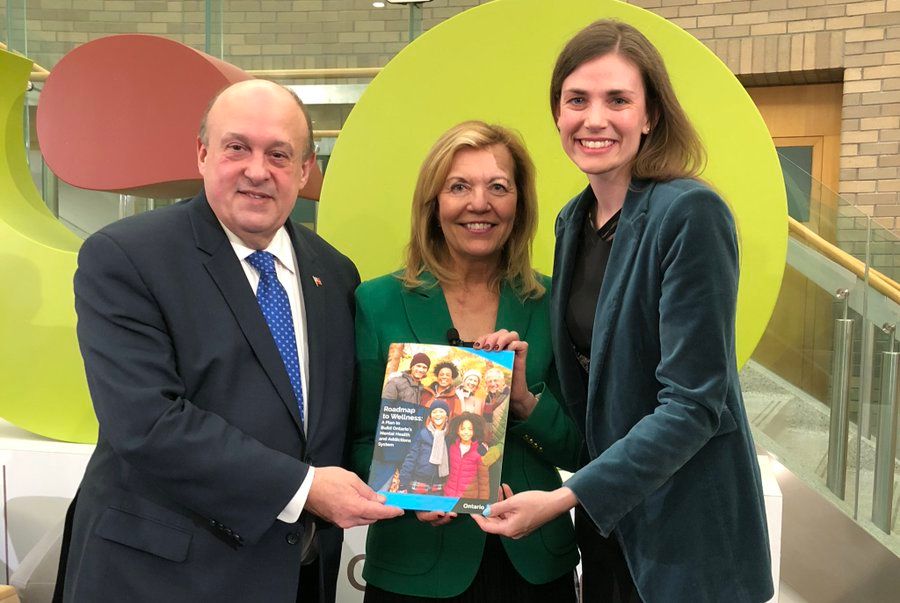Last week as I was scrolling through Twitter, I saw an article from HuffPost Canada that immediately grabbed my attention. The headline started off with “Ontario To Provide Free Therapy”, momentarily bringing me some happiness. Yet just six words later I was disappointed.
That day, Christine Elliott, Ontario’s deputy premier and minister of health, announced the launch of a new mental health “roadmap” that included “four pillars.” Much of the announcement’s coverage, including at HuffPost, Vice, Narcity and my admirers at the Post Millennial, focused on a portion of one of these four pillars, and used phrases such as “free therapy” or “free treatment” in their headlines.
The government describes “Mindability,” the program these outlets reported on, as a “first-of-its-kind in Canada program that will provide evidence-based cognitive behavioural therapy [CBT] to equip Ontarians aged 10 and up with the lifelong skills they need to manage their mental health and overall well-being.”
There is great demand for this sort of program. According to a January Ipsos poll of 28,000 Ontarians, 40 per cent listed access to mental health services as a top healthcare priority, more than any other option given, including wait times for emergency services.
I’m also in favour of entirely publicly funded therapy for anyone who believes they need it, with corresponding access to psychiatrists and free prescriptions, all as part of an effort to incorporate mental health into routine health checkups. What Ontario Premier Doug Ford is offering, however, isn’t that, or anything close.
Here’s the current situation in Ontario: psychiatry is covered by the government, but has incredibly long wait times; the province doesn’t have pharmacare, leading many to have to choose between medicine and food; talk-therapy is only free through a doctor’s office or at the hospital, and otherwise, as of 2015, the Ontario Psychological Association recommends therapists charge $225 per session.
In order to provide free therapy, the government would need to dedicate quite a bit of money toward mental health programs. They appear to be doing so, as the announcement states they are “investing $3.8 billion over 10 years to create new services and expand programs.” In reality, this is actually a cut from what the Liberals announced in 2018, offering $2.1 billion over just four years.
A coalition of major mental health associations and centres said the province’s plan has potential, but “not unless it is combined with substantial and immediate investment in the 2020 Ontario Budget.” They’re calling for at least $380 million more annually to reduce wait times in critical areas.
Additionally, the “Mindability” program, which is supposed to offer free CBT, will only receive $20 million at first. This makes everything that comes next more predictable.
As the government notes in their announcement, “Every year, more than one million Ontarians experience a mental health or addictions challenge.” Yet the Mindability program only aims to treat 80,000 in four years when it is fully-implemented.
The government notes that depression and anxiety are the “two most common mental health conditions.” And yet there are thousands of others who suffer from different mental illnesses, which often have higher mortality rates and are more debilitating, though of course it’s not a contest. They won’t be included in this plan, despite the fact that CBT is used to help treat many of them, including bipolar disorder, obsessive compulsive disorder, etc.
Moreover, the requirements for entry to the program are unclear at this point. For example, do you need to already be formally diagnosed with depression or anxiety to get into this program? If so, how does this help all the people who haven’t yet gone through the lengthy process to get a diagnosis? If not, how is a professional supposed to determine if a patient has anxiety or depression within the single assessment offered by the government, and how can we ensure professionals won’t refrain from giving diagnoses because the program is too full? This is not to cast doubt on their integrity, but I can imagine they’ll have to deal with quotas.
(I asked the government media contacts some of these questions yesterday, as well as how depression and anxiety were selected as the only eligible mental illnesses for treatment. One of the contacts, David Jensen of the communications branch, said he would check into it, but I haven’t heard back yet. I will update this article when/if I do so.)
Then, let’s say you’re one of the few people eligible for the program: How likely are you to actually receive treatment? The government announcement notes that “eligible individual[s] will be offered a therapy program that addresses their level of need to support their recovery. The types of services available will include internet-based modules, personal workbooks, telephone coaching and clinical counseling, as well as face-to-face, group and individual therapy.”
This makes it appear as if every individual will be given what they need within a reasonable time. And yet, due to the budget constraints, it seems far more likely that patients will either be funneled into using the internet services or workbooks, which are already available and aren’t comparable to personal treatment, or end up stuck on long waitlists, which is what Mindability is ostensibly designed to solve.
Moreover, there are no details yet on how many sessions patients can expect, and if these will be determined based solely on need, or according to available resources. Sure, one free therapy session is better than none, and the appropriate amount varies from patient to patient, but research often suggests somewhere between seven to 10 sessions gets results. Will the government program be able to provide anything near that?
Finally, therapy is often used in combination with medication for treatment. Yet psychologists and other therapists aren’t able to prescribe medication to patients. That’s limited to family doctors, who aren’t specialists, and psychiatrists. Ford’s plan doesn’t claim to tackle the long wait times for psychiatrists, but he has made it more difficult for those who need medication: In March 2019, Ford’s government cancelled free prescriptions for those under 25 who have private insurance
I may be accused of pessimism, but based on the Ford government’s record, and the fact that this plan is insufficient even in what it aspires to reach, I think I’m being realistic.
So, while some of the reporting on the announcement included critical voices and was by no means poor, focusing headlines on the “free therapy” angle, even if just for those with anxiety and depression, was misleading, and beneficial only for internal traffic reports. The Toronto Star, in contrast, titled their article “Ontario revamps mental health services”, which isn’t as exciting as “free therapy” but is more accurate.
I hope the program works out better than I expect, but until that’s the case there’s no reason to give the Conservatives the benefit of the doubt.








Member discussion